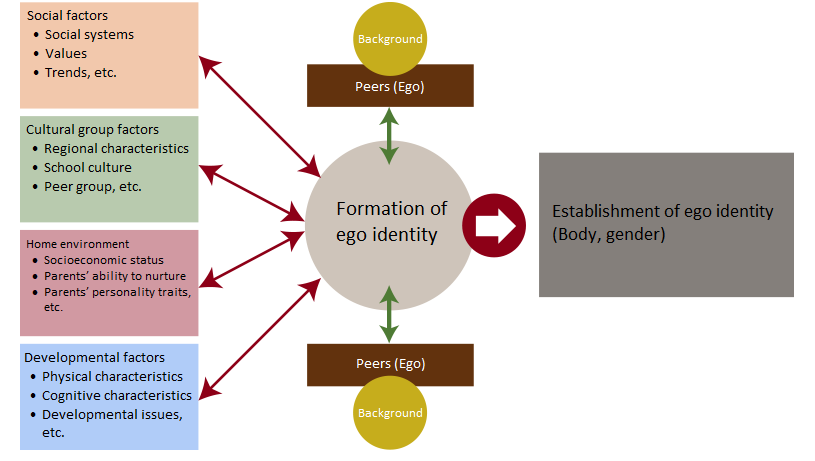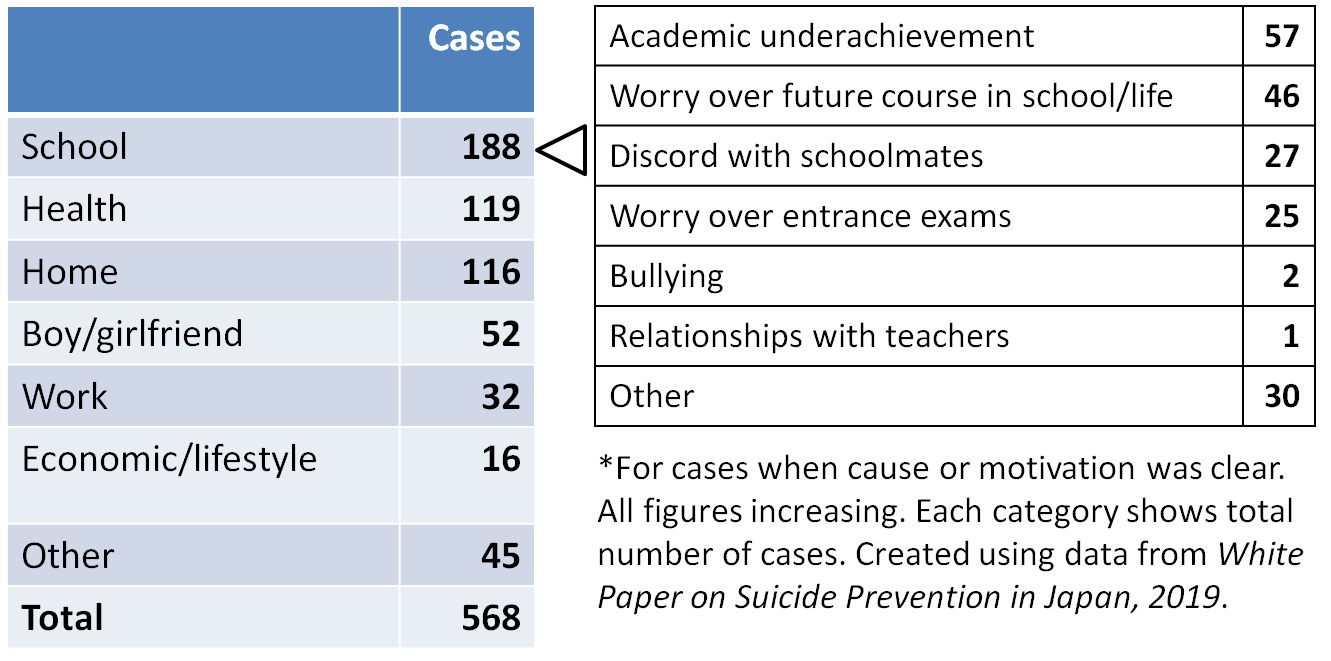[HGPI Policy Column] No.25 – From the Child Health Team – Child Health Column 4 – Adolescent Mental Health Literacy and Its Importance
date : 9/27/2021
Tags: Child Health, HGPI Policy Column
![[HGPI Policy Column] No.25 – From the Child Health Team – Child Health Column 4 – Adolescent Mental Health Literacy and Its Importance](https://hgpi.org/en/wp-content/uploads/sites/2/column-top-childhealth.jpg)
<Key Points>
- Mental disorders are the fourth most common illnesses among adolescents.
- Starting in 2022, high school students will be given opportunities to learn about the prevention and recovery of mental disorders at school for the first time in almost forty years.
- Expectations are high that opportunities for older elementary school students and junior high school students to acquire mental health literacy will also be provided.
Many are aware that people may develop mental disorders alongside the physical and mental growth that occurs during adolescence. After a recent revision to Government curriculum guidelines, mental disorder prevention and recovery will be included in high school health classes starting in 2022. In this column, I would like to discuss mental disorders that affect adolescents and the opportunities people have to learn about them.
Mental disorders during adolescence
It is said that people in Japan go through adolescence from around age 8 to around age 18. Social life during this period mainly occurs in groups centered on the home or school. During the process of growing into adults, children are susceptible to various health problems that occur alongside physical and mental development. According to a 2017 patient survey, mental and behavioral disorders were the fourth most frequent diseases for people ages 5 to 19.*1
Because adolescence is a process of psychological and physical development, it is said to be related to many factors in the formation of the ego identity (Fig. 1).*2 Predominate mental disorders that are commonly known to affect people during this period include schizophrenia, depression, panic disorder, social phobia (social anxiety disorder), obsessive-compulsive disorder, and eating disorders (such as anorexia nervosa and bulimia nervosa). Certain symptoms associated with these disorders may require hospitalization, so it is important that primary care physicians (family doctors) have routes to effectively coordinate with psychiatrists.
According to a report from the Ministry of Health, Labor and Welfare (MHLW), approximately 4.2 million people in Japan were hospitalized or undergoing treatment for mental disorders in 2017. This was about one in 30 people in Japan. It is also said that “one in five people will experience a mental disorder during their lifetime,” so mental disorders are by no means rare. This shows how important it is for people to be educated on and understand mental disorders.*3
Suicide among people ages 10 to 19 is also on the rise even among those who have not been diagnosed with a mental illness. It has been reported that more than 30% of suicides among people in this age group are due to problems at school (Fig. 2),*4 so counseling systems and early detection for mental disorders have become crucial.
Figure 1 (Source: e-Healthnet, “Understanding Psychological Development and Problem Behaviors during Adolescence”)
Figure 2 (Source: “The Students’ Mental and Physical Health Support Handbook – Understanding Mental Health Issues and Providing Support,” Japanese Association of Mental Health Social Workers)
Mental health education for high school students
“Mental disorder prevention and recovery” was added to health education curriculums for first-year high school students in the “Revised Guide to High School Health Education for Nurturing the Power to Live” published by the Ministry of Education, Culture, Sports, Science and Technology (MEXT) in March 2021.*5 According to that guide, the objectives of the unit are to enable students to (1) understand the characteristics of mental disorders and how to respond to mental disorders; (2) be able to identify issues related to mental disorder prevention and recovery; to think of solutions for reducing the risk of mental disorders, to improve quality of life, and to contribute to creating healthy environments; and have the ability to select and explain appropriate methods for achieving these; and (3) be able to take initiative in learning about mental disorder prevention and recovery. This revision of the Government curriculum increases chances that students will successfully acquire mental health literacy (MHL) during a period in life when mental disorders are likely to occur.
However, the issue has been raised that students currently lack sufficient opportunities to acquire MHL during primary and secondary education. “Provide opportunities to learn about mental health” was clearly stated in Japan’s 1972 “Middle School Curriculum Guidelines” under “Section 7 Health and Physical Education, (6) Mental Health,” but there has been no mention of mental disorders since. Given this backdrop, HGPI presented “Mental Health 2020: Proposal for Tomorrow” in July 2020. This proposal highlights the importance of improving education and support systems for mental health in primary and secondary education to enable students to cope with mental health issues over the life course.*6 In addition, the patient survey mentioned above reported that children around the age of five were among those who experience psychological and behavioral disorders most frequently, so we have high expectations for future efforts to provide younger age groups with better opportunities to acquire MHL.
Works referenced
*1 Ministry of Health, Labour and Welfare (MHLW). 2017 Patient Survey Overview. (Accessed July 21, 2021)
*2 Kiyota, A. “Understanding Psychological Development and Problem Behaviors during Adolescence.” (Accessed July 21, 2021)
*3 MHLW. “Starting with Understanding – Let’s Improve Mental Health for All by Deepening Our Understanding of Mental Disorders.” (Accessed September 12, 2021)
*4 Japanese Association of Mental Health Social Workers. The Students’ Mental and Physical Health Support Handbook – Understanding Mental Health Issues and Providing Support. (Accessed August 3, 2021)
*5 Ministry of Education, Culture, Sports, Science and Technology (MEXT) (March 2021). “Revised Guide to High School Health Education for Nurturing the Power to Live” High School Health Education Reference Materials. (Accessed August 11, 2021)
*6 Health and Global Policy Institute Mental Health Policy Project Team (July 2020). Mental Health 2020 – Proposal for Tomorrow: Five Perspectives on Mental Health Policy. (Accessed August 7, 2021)
About the author
Motoki Tamura (Program Specialist, HGPI / Doctoral Student, Community Health & Preventive Medicine Department, Hamamatsu University School of Medicine)
< HGPI Policy Column (No.26) -from the Dementia Policy Team-
HGPI Policy Column (No.24) -from the Dementia Policy Team- >
Top Research & Recommendations Posts
- [Policy Recommendations] Achieving a Sustainable Society of Health and Longevity Through the Integration of Environment and Healthcare-Incorporating a Planetary Health Perspective into the 3rd Phase of The Healthcare Policy-(December 20, 2024)
- [Research Report] Building a Mental Health Program for Children and Measuring its Effectiveness (June 16, 2022)
- [Policy Recommendations] Integrating Climate and Health for a Sustainable Society: Incorporating a Planetary Health Perspective into Nationally Determined Contributions (NDCs)(December 9, 2024)
- [Policy Recommendations] Policy Recommendations on Strengthening CKD Strategies for Workers: The Importance of Providing Early Detection, Intervention, and Support Through Screenings and Medical Visits (October 28, 2024)
- [Research Report] The 2023 Public Opinion Survey on Satisfaction in Healthcare in Japan and Healthcare Applications of Generative AI (January 11, 2024)
- [Policy Recommendations] Developing a National Health and Climate Strategy for Japan (June 26, 2024)
- [Event Report] Planetary Health Expert Meeting Aiming for Sustainable Healthcare: Learning from the Impact of Environmental Pollution and Medical Waste During the Pandemic (February 16, 2024)
- [Policy Recommendations] Obesity Control Promotion Project 2023 “The Next Steps for Engaging and Cooperating with Patients, Citizens, and Communities for Implements of Obesity Control Measurements” (April 8, 2024)
- [Announcement] A Turning Point Towards Building Green Healthcare Systems (June 5, 2024)
- [Research Report] Survey of Japanese Physicians Regarding Climate Change and Health (December 3, 2023)
Featured Posts
-
2024-11-25
[Registration Open] (Webinar) The 130th HGPI Seminar “Marking a Decade of the Act on Medical Care for Patients With Intractable Diseases: Connecting Intractable Diseases and Society From the Perspective of a Media Professional and Family Member” (January 28, 2025)
![[Registration Open] (Webinar) The 130th HGPI Seminar “Marking a Decade of the Act on Medical Care for Patients With Intractable Diseases: Connecting Intractable Diseases and Society From the Perspective of a Media Professional and Family Member” (January 28, 2025)](https://hgpi.org/en/wp-content/uploads/sites/2/hs130-top_JPNENG-1.png)
-
2024-12-18
[Policy Recommendations] Policy Recommendations on Strengthening CKD Strategies for Workers: The Importance of Providing Early Detection, Intervention, and Support Through Screenings and Medical Visits (October 28, 2024)
![[Policy Recommendations] Policy Recommendations on Strengthening CKD Strategies for Workers: The Importance of Providing Early Detection, Intervention, and Support Through Screenings and Medical Visits (October 28, 2024)](https://hgpi.org/en/wp-content/uploads/sites/2/HGPI_20241023_FY2024CKD_eyecatch.jpg)
-
2024-12-20
[Policy Recommendations] Achieving a Sustainable Society of Health and Longevity Through the Integration of Environment and Healthcare-Incorporating a Planetary Health Perspective into the 3rd Phase of The Healthcare Policy-(December 20, 2024)
![[Policy Recommendations] Achieving a Sustainable Society of Health and Longevity Through the Integration of Environment and Healthcare-Incorporating a Planetary Health Perspective into the 3rd Phase of The Healthcare Policy-(December 20, 2024)](https://hgpi.org/en/wp-content/uploads/sites/2/e8a714648913193b03d5b6ede38c161e.png)
-
2024-12-25
[Registration Open] (Hybrid Format) Expert Meeting “Innovations Required to Achieve Precision Psychiatry” (January 22, 2025)
![[Registration Open] (Hybrid Format) Expert Meeting “Innovations Required to Achieve Precision Psychiatry” (January 22, 2025)](https://hgpi.org/en/wp-content/uploads/sites/2/mh-20250122-topr-1.png)
-
2024-12-27
[Activity Report] Second UN General Assembly High-Level Meeting on AMR (September 26, 2024)
![[Activity Report] Second UN General Assembly High-Level Meeting on AMR (September 26, 2024)](https://hgpi.org/en/wp-content/uploads/sites/2/4ED86AF7-49DE-465D-B59D-843B4F3C6102_1_201_a-scaled-1.jpeg)






